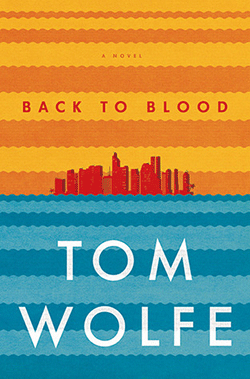In Tom Wolfe’s America the Northern WASP elite is shallow and cowardly, the most sacrosanct minority groups seethe with ingratitude toward the majority and snarl at one another, culture is dominated by the conspicuous vulgarity of new and ill-gotten wealth, and manners and morals are in a catastrophic nosedive in which the relation of man and woman has been reduced to strip clubs and “hooking up.” In other words, unlike the fictions in presidential speeches and media discourse, Tom Wolfe’s fictions tell the truth. And, as our greatest stylist, he tells the truth in real American English as it is spoken, debased as it is by advertising, pseudomacho posturing, and polyglot immigration.
Wolfe’s unerring instinct has chosen Miami for his latest dissection. A Caribbean free port, it is America’s Singapore or Hong Kong, where a majority of the population is one generation or less off the boat, in but not of our country. Here effete WASPs cling to the shreds of deeply resented and envied prestige, whether or not lost in nostalgie de la boue. Self-serving Cuban politicians and police exercise the official power. The most vulgar of the vulgar New York rich abound, along with Russian gangsters and South Americans of every ilk. The news media and educational institutions are only weapons in the struggle for power and place. All groups are more or less corrupted by the moral cesspool in which they live and agree on only one thing: At any cost keep the seething black masses, and especially the Haitians, despised by everybody, including their fellow blacks, from more rioting.
It is “back to blood,” indeed, both in primal tribal loyalty and the unloosing of behavior unrestrained by old notions of civilization. As always, Wolfe has the look, sound, smell, and feel of the place down in vivid perfection. And, as often, his main characters are ordinary, decent people ruined by official cowardice and hypocrisy.
I have often wondered how Wolfe gets away with it. I understand why his books are bestsellers. But given the truth he tells, how has he managed to be a critical success and a media-honored icon of the Manhattan scene? Do They not actually read his books? Or do They really not get the point—as seems to be the case in the film version of The Bonfire of the Vanities, which radically misrepresents the novel’s portrayal of the Big Apple’s dominant ethnic groups? Or perhaps They do get the message but think or pretend that it is not They but somebody else getting the shaft.
Perhaps They are starting to wise up. I doubt that Back to Blood will achieve the celebrity of Radical Chic and The Right Stuff. Wolfe’s mainstream status has begun to slip a little. While his books are highly cinematic, the last one sold to Hollywood was The Bonfire of the Vanities in 1990. In his next to last book, Hooking Up, Wolfe hilariously relates the spiteful, envious, and often incoherent attacks on his work by John Updike, Norman Mailer, and John Irving (“My Three Stooges”), who obviously do not consider him to be one of “Us.” In the same work, equally hilariously, he takes down television news (“Ambush at Fort Bragg”) and The New Yorker (“Tiny Mummies! The True Story of the Ruler of 43rd Street’s Land of the Walking Dead”). His last book, I Am Charlotte Simmons, is a devastatingly accurate portrayal of today’s “higher education.” Surely, They must be catching on.
Wolfe has always shown a certain sympathy with people of real achievements, like the pilots with “the right stuff” and the Middle American geniuses of the computer revolution—and the ordinary folks, like the proletarianized working class in A Man in Full, the naive and decent Charlotte Simmons, and the ordinary Cuban cops in this work. The despised native “crackers” make only a limited appearance in Wolfe’s Miami. They are somewhat clueless, but they seem paragons of American manhood by contrast with everyone else.
If the civilization of the West survives in some fashion, scholars of the future will read Tom Wolfe for clues to our degeneracy in the period before our fall, in the same way that we read Juvenal and Lucius Apuleius for the clues to the decline and fall of Rome.
Isn’t it interesting, by the way, that the two best portrayers of the regular people of New York are Southerners—Wolfe and, in a gentler time, “O. Henry” (William Sydney Porter)—while the literati of New York City disdain their fellow townsmen and aspire to instruct the whole world? The late great George Garrett asked the same question I have asked about how Wolfe gets away with it. His answer, in an essay written over 30 years ago, was that American manners are so debased that it takes a Southerner to recognize an insult when he hears it, and to understand that an insult can mean the same thing “as a knife between the ribs.” As a host of our Southern grandmothers used to say, “Blood will tell.”

Leave a Reply